Faculty Friday: Louis Chude-Sokei
Professor Louis Chude-Sokei joined the BU community last year as a professor of English and the Director of the African American Studies program. He focuses on the intersection of race and technology and has published several works examining the literary, political, and social elements of the African Diaspora. Chude-Sokei is also the Editor-in-Chief of The Black Scholar, which was ranked the #1 journal of Black Studies by the Princeton Journal Reviews.

Tell me a little bit about yourself.
LCS: It’s increasingly difficult to describe [my career]. I think of myself more than anything else as a good old fashioned English professor, though you wouldn’t know it from my work. My work sort of ranges all over the place. I’m also an Endowed Chair in African American Studies, and I’m a writer of non-fiction scholarly work and non-fiction literary work. I came here from the University of Washington; before that I was at the University of Santa Cruz for about 12 years; before that I was at Bowdoin College. I’ve bopped around a bit, but I’m definitely happy to be here right now.
How did you get involved with the Initiative on Cities?
I’m not someone who explicitly studies cities, I’m someone who studies urban life. But people kept telling me about [the IOC], and then I discovered that they have an urban studies minor. Part of what I’m doing here is not just directing the [African American Studies program] but making it grow and redefining it, and urban studies is something that we have to be a part of.
I want us to be recognized as being a part of what the Initiative on Cities is doing, not only because of the thematic connection, but also because it will drive students to both of us. I plan to not only attract students who will be focused on literature, but also attract students who want to do urban studies and all kinds of issues that deal with urban culture. There are students who are going to study cities who expect some conversation about race, and I’ve been impressed by the fact that IOC already has that going on. One of my great ambitions for this program is to make this the central space for race and diversity at BU and the broader Boston community, so I thought it would be a wonderful partnership. I look forward to seeing what can happen.
In your opinion, what is the most pressing issue facing cities and/or urban development?
It varies from day to day. I would like to say residential segregation, but right now, in the wake of two bombshell climate change reports, it’s hard to think about anything other than climate change.
The bombshell of the last two reports, the UN report and the Trump Administration report, has got me thinking very much about priorities. One of the things that’s going on in this program and in my work is rethinking how race works, rethinking response to racial politics and racism, and redefining American racial categories. For example, central to my work is the fact that, if indeed America is becoming “browner”, then Black America is becoming something else too. Immigrants from other parts of the world, who will someday be seen increasingly as climate refugees, are changing how African American culture works and identifies politically. All of those things are in my head now, and I’m trying to figure out how to align them with what needs to be done around the climate. This forces African American Studies and Black Studies to rethink its relationship to immigration, cities, urban life, nature, country, and diet, and these are the types of things I’m trying to build up in the [African American Studies program].
I don’t know that African American culture and politics has fully engaged climate change in the broader sense. I don’t think they’ve found ways to connect racial politics to the climate. I do believe that people think of climate concerns as a luxury. That’s something that needs to be addressed.
I know that some of the people who call themselves climate change deniers, don’t think of themselves as deniers, they think of themselves as people who prefer to innovate their way out of it. And so they worry about regulations killing the spirit of innovation. Also, people with resources, however they may deny climate change, have known about it for a very long time. So they’re already reorienting how they deal with resources in ways to maintain privileges. They’re already turning toward investments that protect them. Although we do focus on how to roll back and change the damage that’s been done, I’m wondering if are at a point where we have to flip over to the other side, and prepare for radical social transformation/collapse.
Of course, when one starts thinking about the privileged and how they’re already preparing for it, then what does it mean in terms of race and immigration? Clearly we know it’s only going to intensify border crossings, but cities will also increasingly become a haven for all these different kinds of people.
What research/current projects are you working on? Perhaps you can expand on your most recent book?
The last book I did, which is sort consuming my professional life right now, is a book about technology, providing a racial history of robotics to artificial intelligence. Sounds strange when I say it to people, but the book actually maps out how the history of technology and artificial intelligence emerges from discourses of race and human bodies, going back from slavery and industrialization to the present.
For example, the word “robot” comes from “robota”, which was created by Karel Čapek, who almost won the Nobel Prize in 1923 when he introduces the word “robot” into the English language. It means coerced labor, or slave. More interesting is the fact that he actually modeled his narratives about robots after Jim Crow segregation laws in the United States. The history of cybernetics, the modern manifestation of the question of artificial intelligence, is constantly paralleling race and slavery. Norbert Wiener, the father of cybernetics, was obsessed with slavery, because he knew that we were beginning to create artificial humans. The question was, how do we treat artificial others, given the history of how we’ve treated those we’ve deemed inhuman, sub-human, without souls, or without intellect – i.e. African slaves. I actually go all the way back to 1864-65, when the idea of artificial intelligence first emerges, in the context of slavery and machines, when machines were seen as a kind of negro or slave.
What the book has led me to now, with the questions and responses I’ve gotten, has been conversations about racist or sexist algorithms, machine learning biases, and deep neural networks. The more sophisticated our programming becomes or the more human it becomes, the more racist it acts. How is it that machines are seemingly racist in how they objectively process things like facial recognition and lending (A.I. control lending for mortgages)? The machine doesn’t see race, but clearly there’s something going on. We know that things like redlining and segregation are bad, so we create algorithms to avoid human error — but the algorithms are worse.
I’m also writing a memoir next year, and doing sonic archiving, where I’m recording the sound of historic sites. I’m interested in recording the sound of important historic sites. I’ve been experimenting with binaural recording, which is a recording that mimics the human ear. Binaural is so sensitive it can pick up changes in pressure.
From an undergraduate’s perspective, what’s the best way for young, college students to engage with their city or engage with current activist movements?
Find out what movements and groups are representing issues they’re interested in and submit themselves to those groups. Go in with humility and just learn. All these groups are hungry for attention and support. So it’s easy to find groups that are welcoming. People tend to be intimidated or afraid, but so many of these groups are sort of ragtag; local groups are always accessible.
The best way to learn about one’s city is to deliberately pay attention to it, either by reading about it, moving through it and exploring the different spaces in it.
What is your favorite thing about Boston?
I’ve only been here one year and three months, but what I like about Boston is that it’s a proper, centralized urban space, but it’s small and manageable. At my stage in life, it’s not overwhelming, and it’s great to discover. I like the size and scale of Boston. Right now i’m curious about more of the history, too.
What is your favorite city?
My heart is really connected to London, but that’s because I spent a lot of time there growing up, when I was young. I’m an Anglophile in terms of culture and urban life; the music, the style — all of those things really shaped me.
London was the meeting place for multiple black cities. I’m half-Nigerian and half-Jamaican; I was born in Nigeria, grew up in Jamaica, which means I was in London a lot, because that’s where you go. That’s where my mother and father met, and where I’ve got lots of aunts and uncles. On the way to Nigeria, I would always stop in London. And sometimes from Jamaica, you would go to London, because it’s also a major Caribbean hub. So London has that personal set of connections for me.
But I do plan to write about a city, if I live to be old enough to do so, and that book is going to about Lagos, Nigeria. I think Lagos is the most mind blowing, incredible city on the planet.
Anything else you would like to add?
I do want to say that one of reasons I’m happy to be involved in the Initiative on Cities is because I want to spend more time formally thinking and talking to people who think about cities. As I said earlier, my focus has always been black life in cities, because black life has defined the texture of urbanity for America for a long time; same with London. Race and the city, in many cases, are interchangeable. My first book talks very much about how the presence of blacks in New York and Philadelphia and Chicago gives rise to distinct American urban culture. A lot of my writing about music has been about recording in space — creating the sense that you’re in the city has been very much a part of black recording techniques in the past century. The way echoes sound in the countryside is different than the kind of echo you get in some sort of industrial wasteland, and things like that have always been a part of black musical sound production, and that has been my interest in technology. The city is the backdrop for black identity politics, identity struggles, and cultural and political and literary expression. It’s inconceivable to have them separately. It’s something that I want to learn more about because I’m fascinated with how race makes and remakes cities.
